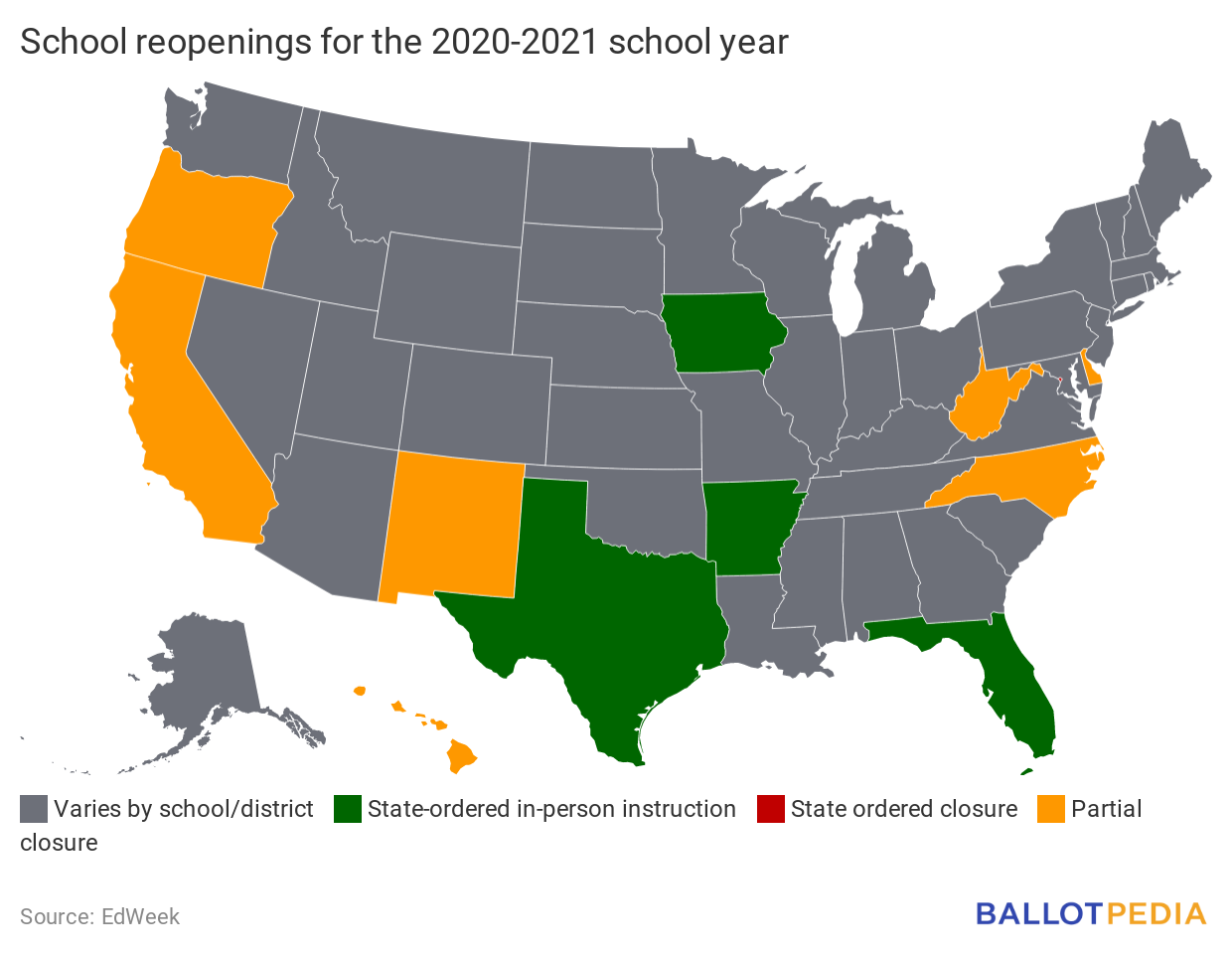Welcome to Documenting America’s Path to Recovery, where we track the status of reopening in all 50 states. Today we look at new limits on private gatherings in Colorado, Nevada’s vaccine distribution plan, school reopenings, and more. Want to know what happened Friday? Click here. Our next edition will be published on Friday, October 30.
The next 72 hours
What is changing in the next 72 hours?
- Illinois (Democratic trifecta): Gov. J.B. Pritzker (D) announced mitigation policies will be implemented in regions 4 and 10 starting Oct. 28 and in Region 11 starting Oct. 30. Bars and restaurants will not be able to offer indoor service, and outdoor service will have to close by 11 p.m. every night. Gatherings will be limited to the lesser of 25 people or 25% of a room’s capacity.
- Mississippi (Republican trifecta): Gov. Tate Reeves (R) announced he will extend the state’s additional mitigation measures to seven more counties, bringing the total number of counties under the order to 16. The order limits gatherings to 10 people indoors and 50 people outdoors. It also requires masks in all indoor public places where social distancing cannot be maintained.
Since our last edition
What is open in each state? For a continually updated article on reopening status in all 50 states, click here.
- Colorado (Democratic trifecta): The Department of Public Health issued an order limiting private gatherings to 10 individuals from no more than two households in counties in the Safer at Home reopening phase.
- Idaho (Republican trifecta): Gov. Brad Little (R) moved the state backward in the reopening plan from Phase 4 to Phase 3, which limits indoor gatherings to 50 people and indoor gatherings to 25% of a venue’s capacity. The order also includes a mask mandate for long-term care facilities. Bars, restaurants, and nightclubs will only be able to serve seated customers.
- Iowa (Republican trifecta): On Monday, Oct. 26, Gov. Kim Reynolds (R) announced the Iowa County Fairs Relief Program, a $6 million initiative that will provide financial support to eligible county and district fairs.
- Louisiana (divided government): Gov. John Bel Edwards (D) filed a lawsuit to strike down the state House of Representatives’ petition to suspend his emergency order (including mask mandates and business restrictions) for seven days. Louisiana law requires the governor to lift an emergency order if a majority of members in either chamber of the state’s legislature file a petition to rescind the order (a majority in Louisiana’s House is 53 members). Gov. Edwards said the law allowing the legislature to overturn an executive order by petition is unconstitutional. We will continue to provide updates in future editions as information becomes available.
- Michigan (divided government): On Tuesday, Oct. 27, Gov. Gretchen Whitmer (D) announced the Teacher COVID-19 Grant and the Support Staff COVID-19 Grant programs to provide financial support to teachers and staff. The state has allocated a combined $73 million to both programs.
- Nevada (Democratic trifecta): On Monday, Oct. 26, Gov. Steve Sisolak announced a statewide vaccine distribution program. The plan distributes a vaccine to healthcare workers and vulnerable populations first, then expands to include retail workers, teachers, and some university staff.
|
Daily feature: Schools
All 50 states closed schools to in-person instruction at some point during the 2019-2020 academic year. Beginning in May 2020, schools in certain states began to reopen. In which states are schools allowed to open? In which states are they ordered to remain closed?
We last looked at school reopenings and closures in the Oct. 20 edition of the newsletter. Since then, the Hawaii Department of Health relaxed school reopening guidance. The state also said it would consider schools’ and districts’ abilities to implement mitigation measures before it would allow reopenings.

Additional activity
In this section, we feature examples of other federal, state, and local government activity, private industry responses, and lawsuits related to the pandemic.
- New Hampshire is asking the U.S. Supreme Court to prohibit Massachusetts from imposing its state income tax on New Hampshire residents who work remotely for Massachusetts-based companies. On Oct. 19, the state of New Hampshire sued the commonwealth of Massachusetts, alleging Massachusetts’ continued taxation of New Hampshire residents who are working remotely from home as a result of the COVID-19 pandemic is unconstitutional. New Hampshire alleges Massachusetts’ “extraterritorial assertion of taxing power is unconstitutional” because it “claims the authority to tax New Hampshire residents who earn their incomes from activities they undertake solely within New Hampshire,” which doesn’t have an income tax. New Hampshire alleges Massachusetts’ policy “subjects Granite Staters to simple but unconstitutional confiscation.” New Hampshire Gov. Chris Sununu (R) said, “Massachusetts cannot balance its budget on the backs of our citizens, punish our workers for making the decision to work from home and keep themselves and their families and those around them safe.” Massachusetts Gov. Charlie Baker (R) said, “Maybe I’ll reach out to my friend Chris Sununu who, when he’s not busy suing me, may be interested in having a conversation.” Because this is a dispute between two states, the U.S. Supreme Court has original jurisdiction.
|


